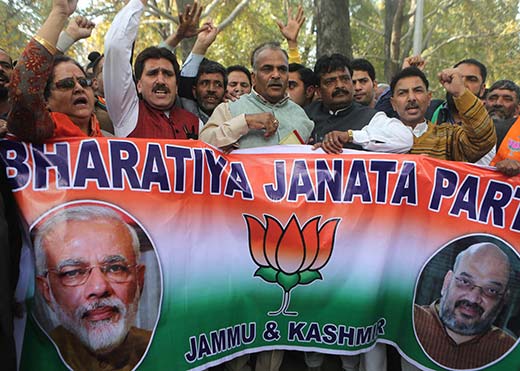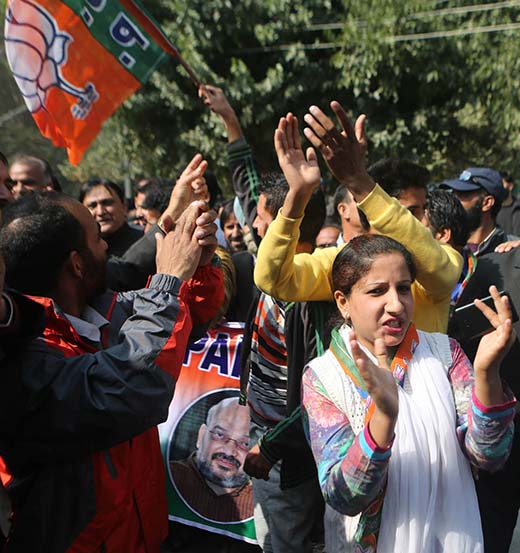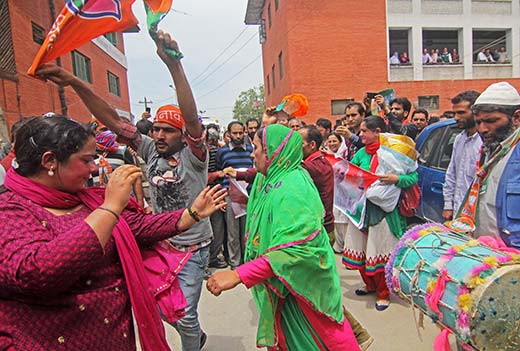As heightened communal tensions are helping it somehow keep it’s vote bank intact in Jammu, the rightwing is a joint family in Kashmir to win trust, members and possibly votes, a Kashmir Life report
Eight months after becoming ‘powerful’, BJP membership in Kashmir alone runs in several lakhs. After failing to score a seat from Kashmir, the focus of BJP campaign is to cultivate such a strong party base that it does not need to look for a coalition partner next time.
Helping it achieve the target are various ‘apolitical’ organisations, NGOs, religious groups and activists, some of whom trace their origins to Rashtriya Swayamsevak Sangh (RSS) and Vishwa Hindu Parishad (VHP).
Riding on ‘Modi wave’ to accomplish Mission 44+, BJP wanted as much as possible participation in 2014 J&K assembly polls. Nothing matched well except the case of needy flood victims with that of an ‘alien’ party’s efforts at turning the opportunity in membership, if not votes.
BJP activists, insiders said, distributed membership forms in guise of flood relief forms in south Kashmir’s Kulgam district to boost up the party’s cadre. Many of them even got the identity cards. They even carried flood relief works in collaboration with Corporate Social Responsibility wings of Delhi, Mumbai and Bangalore business houses.
“Focus was on far-flung areas with a promise of getting works done as petty as issuance of Below Poverty Line (BPL) ration cards, jobs under NREGA and other benefits,” said a local BJP man, who wanted to remain anonymous. Belts around Batengoo, Uranhal, Malpora, Takia Behram Shah and Homeshalibug were the focus.
As the membership didn’t translate into vote, BJP seemed to have learnt from the mistake. “BJP is currently working on strengthening the party base but democratically,” asserts Mohammad Maqbool War, a two-decade old Kashmiri member of BJP. “As of July 2015, we have a membership of 3.5 lakh with 1 lakh among them working as active members.”
According to War, it is for the first time in BJP’s history that party is implementing ‘One Booth Ten Youth’ strategy in Kashmir, reflecting on the work underway in building the party network in the region. “In past, mandates and other decision making in the party was taken on the basis of nominations, which is going to stop. Until and unless the head of BJP in J&K is not from Kashmir, we can’t win a seat from Kashmir.”
As state president of BJP’s Kissan Morcha, War overlooks 12 districts of Kashmir with a network of 25 members from each district who have enrolled in the party by filing a membership fee of Rs 200. “The reason for failure in 2014 was that undeserving people and Congress rejected candidates were given the mandate,” says War, “there’s going to be a complete overhaul of the party structure in December.”
Similar views are echoed by Rafika Bilal of Kulgam. Rafika, who worked as in-charge women’s wing BJP in south Kashmir, says the party is in “total disarray” at this time and there’s “lack of coordination”.
“No meetings take place. Whenever we arrive at party headquarters for a meeting, there are arguments over other issues,” says Rafika. “The women face of BJP is Dr Hina Bhat and Darakhshan Andrabi. They don’t care about us. I arranged a meeting of 300 women at my house and was even attacked by activists of rival parties.”
BJP State Secretary and co-convenor of ‘Maha Sampark Abhiyaan’ Engineer Ghulam Ali Khatana says party has adopted a different strategy in consideration with the ground realities of the region. In Kashmir, party has divided the region into North, Central and South Kashmir zones. J&K BJP has six vice-presidents and two general secretaries reporting to a president. Khatana, who is also state in-charge of BJP Muslim & Tribal Morcha, revealed that online membership drive of giving missed calls on numbers announced by the party for those who felt attracted towards its politics, brought two lakh people from Kashmir into the party fold.
“After receiving a missed call, a party activist had to reach out to the caller and then follow up with the necessary formalities,” says Khatana. “RSS is a traditional organization with a great vision for the sub-continent,” says Khatana when asked whether RSS or its affiliates were helping BJP to widen its Kashmir base. “They work everywhere irrespective of who is governing the state. Doing welfare work during earthquake, floods and other calamities is due to the nationalistic idea of RSS who treat every citizen of the country with love and warmth.”
RSS is channelling its energies through its Muslim wing Muslim Rashtriya Manch under the guidance of Margdarshak Indresh Kumar, key RSS functionary whose name had figured during the investigations of 2006 Malegaon blasts. Established in 2002, MRM’s leaders have been frequenting valley since long.
In anticipation of 2014 polls, MRM’s efforts intensified. Roping in a Daryaganj-based Muslim organisation Jamaat Ulema-e-Hind (not to be confused with 96-year-old Jamiat Ulama-i-Hind) to “establish contacts with the local clergy and project Modi as the only saviour of Kashmiri Muslims”, the group conducted an extensive field work in the valley.
Led by Maulana Sohaibuzaffar Khan Qasmi, a student of Darul Uloom, Deoband, the group consisted of Muslim clerics cutting across different sects and with close ties to BJP and RSS, preaching how “BJP has changed and is not the BJP of Babri Masjid period.”
Jamaat Ulama-e-Hind emerged after the split of Jamiat Ulama-i-Hind in 2008. However, the religious organisation achieved prominence prior to 2014 Lok Sabha polls when it was entrusted with the PR exercise for Narendra Modi among the Muslim vote.
Founder and president of (JUH) Maulana Qasmi was among the few Maulvis who reached Reshambag RSS karyalaya in Nagpur to pay homage to former RSS sarsanghchalak K S Sudarshan following his death in September 2012.
In February 2015, a Muslim cleric’s statement that “Lord Shiva was the first prophet of Islam and Muslims are followers of Sanatan Dharma (Hinduism)” had triggered a backlash from Muslim clergy and religious leaders. The statement was made by Mufti Muhammad Ilyas, a close aide of Qasmi and part of the Jamaat Ulama-e-Hind, on the sidelines of a visit by a delegation of clerics to Ayodhya.
Despite repeated attempts, Qasmi didn’t respond to any communication from Kashmir Life. “There was a sharp clarity to their arguments,” says an Islamabad resident who attended one of the meetings of the group. “They told us there’s no difference between NC, PDP, Congress and BJP when it comes to Kashmir. If Kashmiris have tested all the first three why not give a chance to later to prove that it’s different.”
Talking anonymously the resident also says “the clerics even acknowledged the disputed nature of Kashmir but in their words no central government except BJP led by Modi was brave enough to make efforts to solve the dispute.”
National Organizing Convener of MRM Girish Juyal says they are working to save “Kashmiriyat for which Kashmir is known and respected across the world.”
“We are doing God’s work. Our aim and purpose is to ensure that only God’s fear should be there,” says Juyal, his sentences punctuated with pure Urdu and Arabic words. “Currently, we are working in 39 assembly segments of the valley with half a dozen NGOs prominently in each district.” He, however, refuses to divulge names of the NGOs saying it’s not “appropriate this time.”
According to Juyal, an RSS affiliate for almost four decades, the group has been working in Kashmir since long. In the aftermath of devastating earthquake in 2005, MRM distributed around 18 truckloads of relief material. Same kind of relief work was carried out after September floods.
In 2015, MRM brought more than 500 Maulvis to Kashmir from mainland India to preach peace! “During elections, we didn’t tell people to vote for a particular party but just make sure that they vote. We just wanted to defeat those elements that are hell bound to tarnish the spiritual and peace-loving image of Kashmir.”
Taking a dig at Hurriyat who according to Juyal, are “enemies of peace and are being remote-controlled” from outside, he says “what is wrong if we are helping orphans with their education or doing any other social work to help people? Kashmiris are being exploited for political interests by those who want to destroy the valley of saints.”
“MRM conducts its meetings except on Fridays as we don’t need people to gather after prayers to pelt stones,” says Juyal. He claims MRM can gather 1.5 lakh people from Kashmir for its meetings and interactions on a single day.
Following 2010 unrest, Bharatiya Janata Yuva Morcha (BJYM) National President Anurag Thakur announced that he will conclude his Rashtriya Ekta Yatra from Kolkata at Lal Chowk Srinagar where he will hoist tri-colour on Republic Day. Omar Abdullah led NC-Congress who were still struggling to put the state back on ‘normalcy track’ didn’t allow it.
Back to 2015, soon after the release of Muslim League leader Masarat Alam and Pakistan flag waving controversy had echoed in the corridors of Indian parliament, a similar kind of flag hoisting ceremony at Lal Chowk was announced by a Delhi-based NGO: Youth for Nation. The NGO wanted to “take on anti-national forces working at the behest of Pakistan in J&K to spread anti India rant and to express solidarity with thousands of pro-India people who are fighting separatism and Pakistan sponsored terrorism in Jammu and Kashmir.”
The announcement was made through a 2.13 minute video clip with Indian national flag running in the backdrop by President (YFN) Nimrandeep Singh. In the clip, widely shared on social media, Nimrandeep asked separatist leaders like Syed Ali Geelani, Yasin Malik and Masarat Alam that there anti-India rant was intolerable.
Twenty-eight-year-old Nimrandeep Singh is from Rajpura in Punjab’s Patiala district. According to Nimrandeep, his NGO is indulged in social work since last seven years. “Our focus is social issues like dowry, drug addiction and female foeticide,” says Nimrandeep, who has worked in several multi-national companies in various capacities. Most of the funds are raised from donations and charity functions.
When asked how did the idea of hoisting tri-colour at Srinagar’s Lal Chowk come up, Nimrandeep says the issue emerged during one of his meetings with the members of his NGO. “We were really disturbed by the images of Masarat Alam and other separatist leaders waving Pakistani flags in Kashmir. They live in India and shout slogans like ‘Jeeve Jeeve Pakistan’ and exploit people, thus disturbing the peace in valley. We decided to hoist tri-colour on May 16 but the state government did not permit us.”
Nimrandeep talks on secular lines and stresses that all religions preach the same thing. Quoting a verse from Quran, he says “God is mentioned in the holy book as ‘Rabul Aalmeen’ meaning God of the whole universe and not of a particular sect or religion.”
He also takes dig at political parties across the spectrum for exploiting people and creating an atmosphere of insecurity and hatred. “We have many programs in pipeline but we are soon going to have an interaction between youth from various Indian states who will exchange their views with youth from J&K. Our people in J&K are doing ground work for that,” Nimrandeep says.
While the attempts of BJP to gather support from Kashmir are on different fronts, the party has also been able to penetrate in the traditional vote bases that hinge on family and religious loyalties.
In Budgam, the party was able to rope in Aga Syed Mohsin, a relative of NC MLA and former cabinet minister Aga Syed Ruhullah.
Even though Aga Mohsin joined BJP in March 2014, he was denied mandate in the assembly elections, prompting him to look for other options. However, according to Aga Mohsin, a phone call from P S Gill, a former Punjab Police DGP known for spearheading counter-insurgency operations in the Valley during 90s and now BJP member, ensured his trust in the party.
“BJP treats all the persons – whether ministers or a lower-rung party worker – equally. There’s no discrimination,” says Aga Mohsin who also runs an NGO called J&K Rural Development Association since 2003.
Originally a brick-kiln owner and “active Social Worker” Mohsin started his political career with J&K Labour Party in 2008. After the party failed to pick up, he joined Congress in 2011. Aga Mohsin claims he enjoys a network of around 200 people through his NGO helping him to understand ground like no other.
“The party is actively growing but if the promises made by central government would have been kept, many more would have been attracted towards BJP,” Aga Mohsin adds.
A senior BJP leader also talked about the limitations of the resources when it comes to deliver before people.
“At many times, we have to help people from our own pockets. There are certain ministries where we can’t go with a request of addressing public grievances as those portfolios fall under PDP ministers,” says the BJP leader, adding “that might hurt our vote prospects.”
There’s another peculiarity to the coalition government. Sources say BJP cadre in South Kashmir has been a consistent source of embarrassment for PDP ground workers who have even faced scolding from Chief Minister Mufti Mohammad Sayeed.
People familiar with the matter say whenever CM plans to visit an area in south Kashmir, the BJP cadre quickly drapes the region with lotus buntings and flags, leaving the top PDP leadership including CM miffed.
“There’s no green around. It’s only saffron,” a local sums up.


















